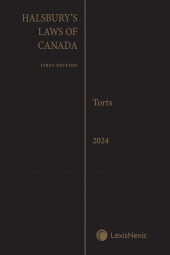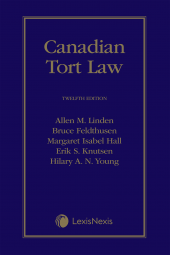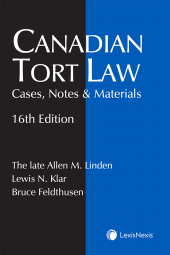Halsbury's Laws of Canada – Torts (2024 Reissue)
One Year Subscription Only Terms
Subscribers receive the product(s) listed on the Order Form and any Updates made available during the annual subscription period. Shipping and handling fees are not included in the annual price.
Subscribers are advised of the number of Updates that were made to the particular publication the prior year. The number of Updates may vary due to developments in the law and other publishing issues, but subscribers may use this as a rough estimate of future shipments. Subscribers may call Customer Support at 800-833-9844 for additional information.
Subscribers may cancel this subscription by: calling Customer Support at 800-833-9844; emailing customer.support@lexisnexis.com; or returning the invoice marked 'CANCEL'.
If subscribers cancel within 30 days after the product is ordered or received and return the product at their expense, then they will receive a full credit of the price for the annual subscription.
If subscribers cancel between 31 and 60 days after the invoice date and return the product at their expense, then they will receive a 5/6th credit of the price for the annual subscription. No credit will be given for cancellations more than 60 days after the invoice date. To receive any credit, subscriber must return all product(s) shipped during the year at their expense within the applicable cancellation period listed above.
Product description
Begin updating your law library today!
$148* per volume (ISBN: 9780433454946) OR purchase individual volumes at $335 each.
For more information or to place an order please contact us.
*Per volume with commitment to purchase the entire 72-volume set.
------------------------------------------------------------------------------------
The law of torts hovers over virtually every activity of modern society. No enterprise, action or profession is beyond its potential scope. As a result, tort law is of real concern to most legal practitioners, jurists and academics. With respect to negligence, accidents happen every day, raising several legal issues. Virtually no area of practice is untouched by the implications of negligence law, as questions of standard of care and causation arise in every aspect of human endeavour, inevitably making their way for resolution into law offices across Canada.
Newly revised and thoroughly updated, Halsbury's Torts (2024 Reissue) defines and explains the application of the law in Canada relating to civil wrongs. From negligence to intentional torts, strict liability, nuisance, occupier's liability, product liability, Québec's law of delict and limitation of actions, this invaluable volume provides a black-letter narrative of the law for everyone seeking a straightforward understanding of the subject.
Topics in this essential national reference include:
- Intentional torts
- Intentional conduct
- Specific torts
- Defences
- Damages
- Requisite elements of negligence
- Requirement of damage
- Limitation periods
- Multiple causes of action
- Causation
- Onus of proof, inferences and material contribution
- Multiple causes
- Requirement of damage
- Standard of care and its breach
- Defining the parameters of the "reasonable person"
- Unreasonable risk
- Likelihood and severity of harm
- Reason for taking risk
- Cost of avoiding risk
- Factors affecting the appropriate standard of care to be applied
- Age
- Mental illness
- Gross negligence
- Custom
- Establishing custom
- Causation
- Significance
- Medical custom as reasonable care
- Failure to follow custom
- Statutory violations
- Application to specific professions
- Duty of care
- Neighbour principle
- Recognizing new duties
- Determining whether duty is novel
- Foresight and proximity
- Policy reasons for denying duty
- Failure to act
- Unforeseeable plaintiff
- Evidence and proof
- Burden of proof
- Inferring negligent conduct
- Inferring responsibility of defendant
- Trespass and inevitable accident
- Remoteness or proximate cause
- Thin-skull plaintiff
- Rescue attempts
- Intervening acts
- Psychiatric damage
- Pure economic loss
- Public authorities
- Policy vs. operational decisions
- Restated Anns test
- Standard of care and causation
- Misfeasance in public office
- Defences to negligence
- Contributory negligence
- Voluntary assumption of risk
- Illegal conduct
- Strict liability
- Scope of Rylands v. Fletcher
- Defences
- Vicarious liability
- Nuisance
- Public and private nuisance
- Statutory and common law defences
- Remedies
- Occupier's liability
- Trespassers, licensees, invitees and contractual entrants
- Legislative framework in various jurisdictions
- Product liability
- Contract theory
- Negligence theory
- Proof
- Defences
- Class actions
- Delict
- Requirements
- Capacity
- Fault
- Injury or harm
- Causation
- Vicarious liability
- Liability for harm caused by things in one's custody
- Requirements
- Limitation of actions
Table of contents
I. Introduction
II. Intentional Torts
III. Introduction to Negligence and Requisite Elements
IV. Standard of Care and Its Breach
V. Duty of Care
VI. Evidence and Proof
VII. Scope of Liability (Remoteness or Proximate Cause)
VIII. Special Problems of Negligence
IX. Defences to Negligence
X. Strict Liability
XI. Nuisance
XII. Occupier's Liability
XIII. Product Liability
XIV. Delict
XV. Limitation of Actions
 Lexis Nexis
Lexis Nexis 


